Daily Writing
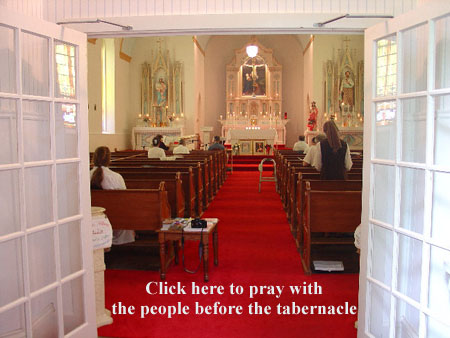
| Shepherds of Christ Daily Writing |
 |
November 27, 2010
November 28th Holy Spirit Novena
Scripture selection is Day 1 Period II.The Novena Rosary Mysteries
for November 28th are Luminous.
We need funds for the mailing
of Fr. Joe's book
Our Lord wants out.
Call 1-888-211-3041
Please pray for Jimmy &
Delores.
Give gifts that last.
Please remember us when buying
your Christmas gifts.
Can anyone please help us payoff
our loan on the building?
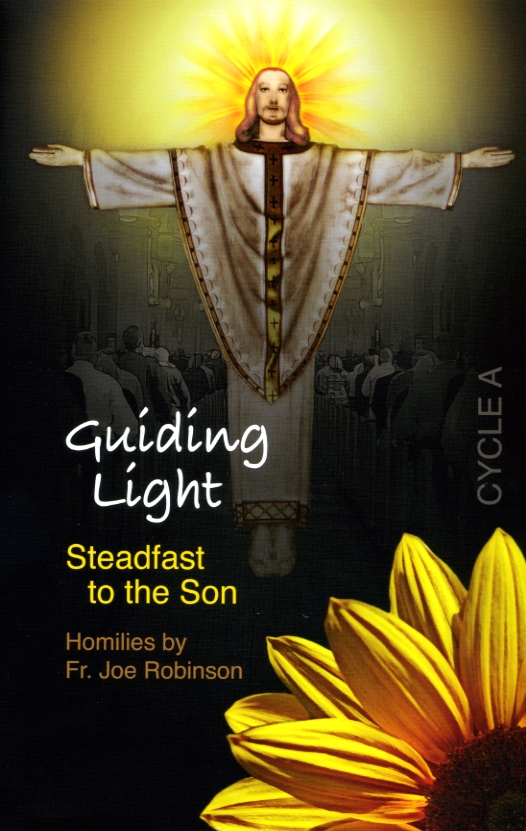
Homilies by Fr. Joe Robinson
Please help us.
Call Doris 1-888-211-3041
or Call
1-727-725-9312
November 27, 2010
I see that struggle between what
God wants and how satan wants to
be in power —
Satan seeks to rule
But he will never rule over God —
Then Jesus was led by the Spirit out into the desert to be put to the test by the devil. He fasted for forty days and forty nights, after which he was hungry, and the tester came and said to him, ‘If you are Son of God, tell these stones to turn into loaves.’ But he replied, ‘Scripture says:
Human beings live not on bread alone
but on every word
that comes from the mouth of God.’The devil then took him to the holy city and set him on the parapet of the Temple. ‘If you are Son of God,’ he said, ‘throw yourself down; for scripture says:
He has given his angels orders about you,
and they will carry you in their arms
in case you trip over a stone.’Jesus said to him, ‘Scripture also says:
Do not put the Lord your God to the test.’
Next, taking him to a very high mountain, the devil showed him all the kingdoms of the world and their splendour. And he said to him, ‘I will give you all these, if you fall at my feet and do me homage.’ Then Jesus replied, ‘Away with you, Satan! For scripture says:
The Lord your God is the one
to whom you must do homage,
him alone you must serve.’Then the devil left him, and suddenly angels appeared and looked after him.
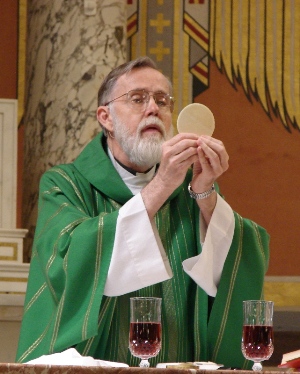
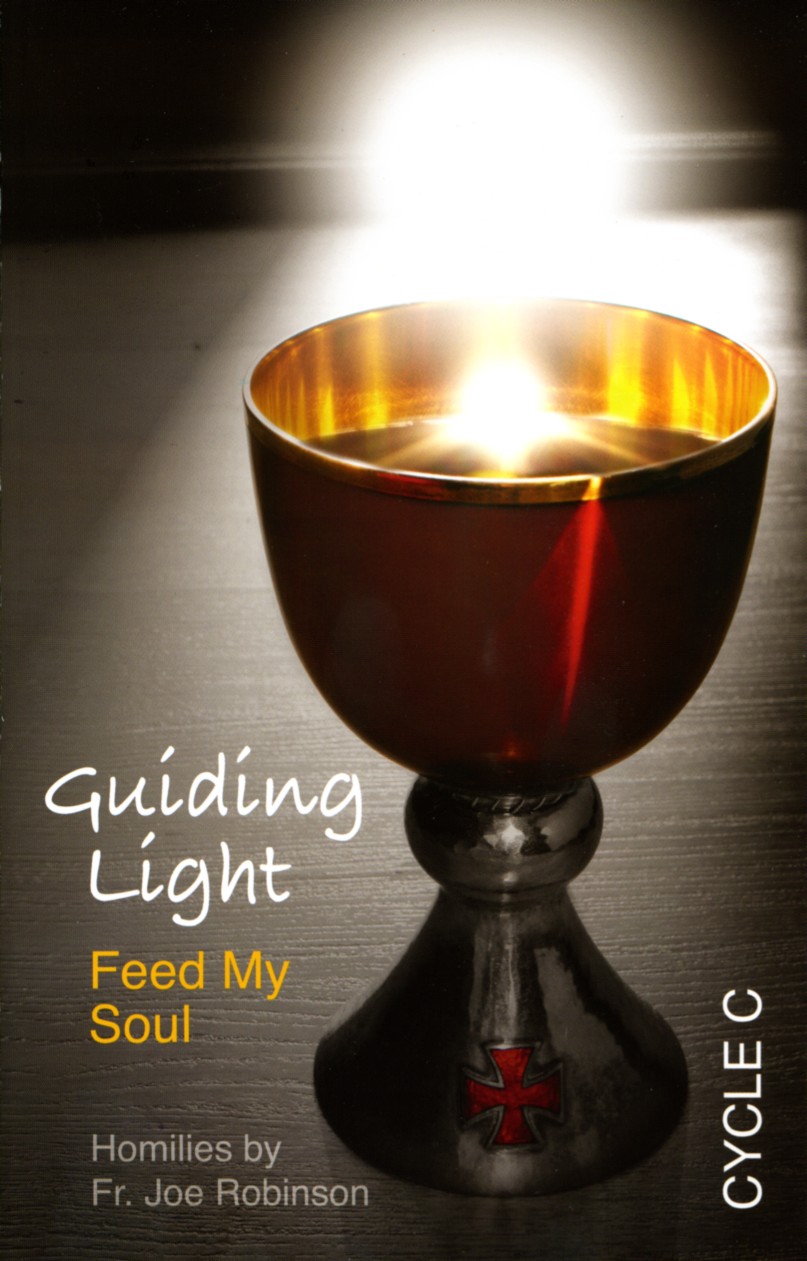
Christ the King
November 25, 2007
INTRODUCTION: When the first king of Israel, King Saul, was killed in battle, the southern part of Israel chose David as their king. The northern part chose Ishbaal, King Saul’s son, to be their king. Ishbaal was inept and after seven years of chaos, the northern tribes turned to David and asked him to rule them also. This is where our first reading comes in. David was a successful leader and, in spite of some serious misbehavior, was viewed throughout Jewish history as an ideal king. The Jews always hoped for another king like him. When a king assumed his office, he was anointed and thus the ideal king the Jews longed for was often referred to as “the anointed one.” The Hebrew word for this is “Mashiah,” or as we say it: “Messiah.” When Mashiah is translated into Greek we have “Χριστός.” So when we call Jesus “Christ” we are in effect saying Jesus, the King. Christ’s kingdom is not an earthly one, as St. Paul tells us, but it is eternal and a sharing in God’s own authority and power.
HOMILY: This will be my last homily for this year. Before everyone cheers or wonders whether I am taking an extended vacation, I should tell you I’m talking about the liturgical year -otherwise known as the Church year. Next Sunday is the first Sunday of Advent, and we begin again a new Church year, preparing ourselves to celebrate Christ’s birth. Before we know it, we’re into Ash Wednesday, and it is especially early this year. The last time Lent came so early in the spring (and that’s because Easter is early) was 89 years ago. Starting next Sunday, then, we begin to recall the major events of Jesus life: his birth, his death, resurrection, ascension and his sending of the Holy Spirit. After Pentecost, as usual, we hear about his miracles and his teaching as presented to us in St. Matthew’s gospel. And as usual, at the end of the liturgical year, we will again celebrate the feast of Christ the King.
The feast of Christ the King was established in 1925 by Pope Pius XI. You might wonder, didn’t Pius XI know kings are not so popular any more? But what else could we call Christ? Should we call him instead a president, a prime minister, the chairman of the board, a dictator, president for life? The title “King” is most fitting for Christ. But he is not the same as any other king. His power is absolute and eternal. He has received his authority and power from God the Father and that will never change.
When we think of kings, it is automatic to associate them with castles and crowns, royal robes, jewelry, servants, armies and various symbols of wealth and power. Today Jesus, our king, is pictured hanging on the cross, his crown a crown of thorns. His small group of followers is nowhere to be found except for his mother, one faithful Apostle, and a couple of women. No rings were on his fingers, just nails in his hands and feet. No royal robes, instead he was most likely stripped naked as was the Roman custom. Later centuries have covered him over with a loin cloth for modesty. No one is cheering him or praising him. His enemies are outdoing each other mocking him. After three years working to establish a kingdom of love, he is condemned as a criminal, tortured and executed. He warned his followers some of them would suffer in a similar fashion. It’s a wonder he had any followers at all.
I am always impressed when I think of what Jesus did in three years. Moses labored for 40 years, Buddha 45 years, and Muhammad 23. The carpenter on the cross, with the sign above his head, Jesus Christ, king of the Jews, who came from a politically and religiously insignificant part of an insignificant country, influenced this world more than any human being that ever lived. After two thousand years a billion people, including ourselves, call him our king! If some of his followers reflected his teachings more faithfully, there might be six billion who now follow him. Jesus is a king who does not parade around in worldly glory or demonstrate worldly power. However, he is greater than any king who ever lived, for he is “the image of the invisible God, the firstborn of all creation.”
Our king does not rule by arms and weapons. Arms and weapons get people’s attention. Without having someone to stand over us with a club or a gun, we are tempted to feel “why do I have to do what they tell me?” A lot of people feel that about Jesus. The people who put him on a cross felt that way, except for his few friends and the thief who asked to be remembered when Jesus entered his kingdom. The Jewish leaders thought they would be rid of this troublemaker, this bossy person who went around telling people how they should live. They didn’t understand the power that he lived by and taught by, the power of love. He will always be a king who rules with love, but whether or not he is king in our lives and in our hearts is up to us. If we respond to him in love, it will lead us into his kingdom of new life.
A cartoon in the New Yorker showed two fellows walking to lunch one day and the one was complaining to the other: “my boss keeps telling me what to do.” Authority is not popular, we like to make our own rules, even with regard to God. The new age theology, which is really a return to paganism, views Christ as a nice guy who overlooks our bad behavior and is going to reward all of us in the end, no matter how we’ve lived. He will forgive us if we turn to him. Notice his words of forgiveness were directed only to one of the two crucified with him. We cannot take our salvation lightly. The cross was not a joy ride for Jesus. Salvation is serious business and Jesus suffered in order to win salvation for us. But he can only save us if we do not forget that he is always our king, not just in an abstract way but in our concrete, everyday lives. Amen.

1st Sunday of Advent
Isaiah 2: 1-5
The vision of Isaiah son of Amoz, concerning Judah and Jerusalem.
It will happen in the final days
that the mountain of Yahweh’s house
will rise higher than the mountains
and tower above the heights.
Then all the nations will stream to it,
many peoples will come to it and say,
‘Come, let us go up
to the mountain of Yahweh,
to the house of the God of Jacob
that he may teach us his ways
so that we may walk in his paths.’
For the Law will issue from Zion
and the word of Yahweh from Jerusalem.Then he will judge between the nations
and arbitrate between many peoples.
They will hammer their swords
into ploughshares
and their spears into sickles.
Nation will not lift sword against nation,
no longer will they learn how to make war.House of Jacob, come,
let us walk in Yahweh’s light.
Besides, you know the time has come; the moment is here for you to stop sleeping and wake up, because by now our salvation is nearer than when we first began to believe. The night is nearly over, daylight is on the way; so let us throw off everything that belongs to the darkness and equip ourselves for the light. Let us live decently, as in the light of day; with no orgies or drunkenness, no promiscuity or licentiousness, and no wrangling or jealousy. Let your armour be the Lord Jesus Christ, and stop worrying about how your disordered natural inclinations may be fulfilled.
Matthew 24: 37-44
'As it was in Noah’s day, so will it be when the Son of man comes. For in those days before the Flood people were eating, drinking, taking wives, taking husbands, right up to the day Noah went into the ark, and they suspected nothing till the Flood came and swept them all away. This is what it will be like when the Son of man comes. Then of two men in the fields, one is taken, one left; of two women grinding at the mill, one is taken, one left.
'So stay awake, because you do not know the day when your master is coming. You may be quite sure of this, that if the householder had known at what time of the night the burglar would come, he would have stayed awake and would not have allowed anyone to break through the wall of his house. Therefore, you too must stand ready because the Son of man is coming at an hour you do not expect.
1st Sunday of Advent
December 2, 2007
– (Isaiah 2: 1-5, Romans 13: 11-14, Matthew 24: 37-44) The prophet we hear in today’s first reading lived over 700 years before Christ. Most probably he had witnessed the destruction of the northern kingdom of Israel by the Assyrians, fierce warriors who came from what is modern day Iraq. The southern kingdom of Israel, centered in Jerusalem, lived in fear and trembling that the same fate awaited them. In spite of great turmoil, his message is a message of peace, a peace we continue to yearn for. It is a peace, however, that flows only from walking in God’s ways.INTRODUCTION
HOMILY
– Most of us remember when people used to wait until after Thanksgiving to get ready for Christmas. Now the stores start preparing right after Halloween or earlier. It’s interesting that 1500 years ago people in France started preparing for Christmas on November 11 (the feast of St. Martin). They weren’t busy shopping, but they prepared by fasting three days a week. A century later Christians were fasting every day from November 11 until Christmas. This was known as “St. Martin’s Lent.” The practice spread. As far as we know, this may have been the beginning of Advent. Many still remember, I’m sure, that Advent was a time to do penance or give up things to prepare for Jesus’ birth. Often we went to confession during that time to prepare ourselves better spiritually. Our world is so different. The aspect of spiritual preparation has slipped into the background, while we busy ourselves with so many other projects that we “have” to finish by December 25. I wonder if those who are trying to get Christ out of Christmas are winning, because in our world today, if Christ plays any part at all in our preparations for his birth, it is only a minor part.Now, I don’t want to sound like “Bah! Humbug!” Joy at Christ’s birth is certainly an appropriate emotion at this time. And trying to act kindly to one another and showing greater appreciation for those we love is always in season. But commercialism and materialism has, in so many instances, caused us to shift our focus away from the spiritual side of what we are celebrating.
The real, spiritual meaning of Christ’s birth comes only through prayer and reflection. Fasting, as Christians did centuries ago, probably wouldn’t do most of us too much harm. Fasting doesn’t always involve food. We could fast from smoking, gambling, entertainment, criticizing, keeping so busy that we seldom have time for prayer. Let’s not forget the big picture: Christ came down to us for only one reason, to bring us new life, to lift us up to himself. It would be a shame to miss the opportunity Advent offers us to enrich ourselves spiritually and to open ourselves more fully to God’s love.
There is another important reason for us to take Advent seriously: being ready to meet Christ when he comes again to call us from this life to himself. Will we be ready? The second reading for today and the gospel stress this aspect of Advent. St. Paul said in today’s second reading: “it is the hour now to wake from sleep.” And Jesus too tells us “Stay Awake!” We never know when that day will come. Since it’s impossible to stay awake physically, it is obvious Jesus is talking about staying awake spiritually. Certainly the people Jesus gives as examples in today’s gospel about those eating and drinking, marrying and giving in marriage, those working out in the field or grinding corn at the mill were physically awake, but apparently not all were spiritually awake. They were consumed with their everyday activities and were not prepared when God called them. The examples Jesus uses about two people doing something and one suddenly being taken and the other being left have nothing at all to do with a popular notion known as “the rapture.” They emphasize the suddenness with which the Lord may come to any one of us.
Our salvation is nearer than when we first believed, St. Paul tells us. When Christmas comes are we going to celebrate God’s love in Jesus’ birth or are we just going to celebrate that it’s all over? What we do the next few weeks will answer that.
We see the divided Kingdom —
We see our world divided —
As I mentioned a few days ago — we
are always choosing and we are
preparing for our eternal salvation —
I can look at the division of a small
country —
There can be division
I look at the scriptures and the
trial Christ when through —
Christ - the King of all Kings —
Division — aggression — wanting power over —
God created the world from nothing —
I see the gifts He gives in the snow
I see the gifts He gives in the autumn leaves
I see the gifts He gives in the ocean
The beauty
I see the gifts He gives in a baby —
Watching a child grow and learn to love
Be social —
I see the creation of God — His handprint
in what He created
AWESOME
I see the disobedience of Adam and Eve
I know God has called us in the Shepherds of Christ
to help bring the Reign of Jesus' Heart of love and
the triumph of Mary's Heart
I see the call of Jesus and Mary —
to spread the consecration to the Sacred Heart and Immaculate Heart —
to make Jesus the King and Center of all places on this earth —
To Consecrate all places, churches, schools
to the Sacred Heart and Immaculate Heart
Prepare for Christmas —
Prepare your hearts —
Open —
When you clean out clutter there is space —
When we clean our hearts — there is room
for love and faith and hope —
not darkness —
God increase our faith, hope and love —
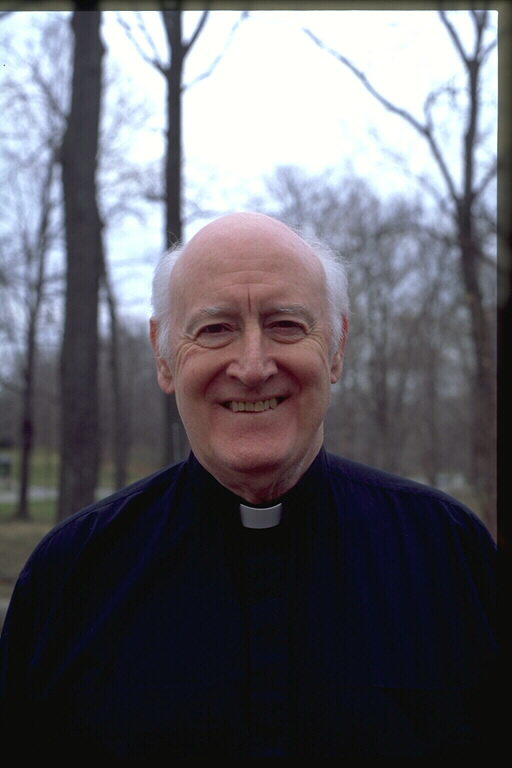
Jesus speaks:
I wish you to publish the
book: Response in Christ and
circulate it and make it available
to the priests —
I wish the Tiny Tot books to be
published on the rosary —
one at a time as soon as possible —
They are small and this will
immensely help the little ones —
I wish you to continue circulating
Cycle A to all the priests in the
United States and the Foreign Bishops -
I wish prayer chapters with these
prayers —
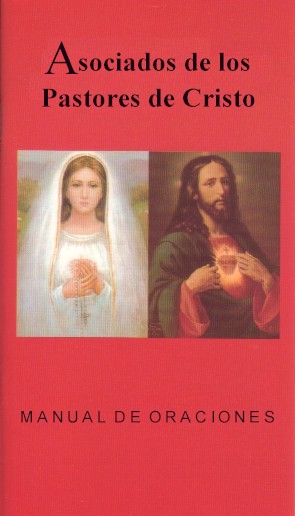
|
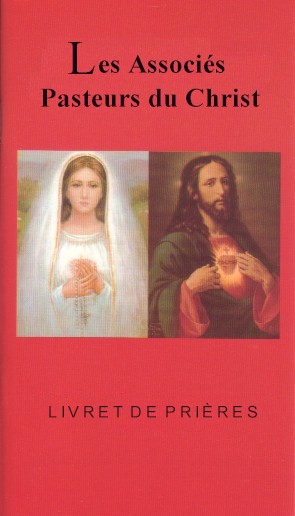 |
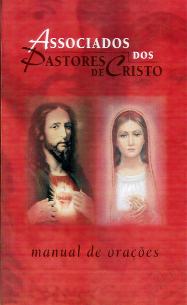
|
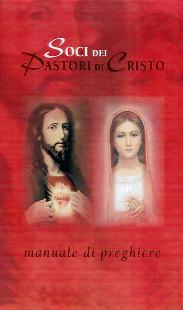
|
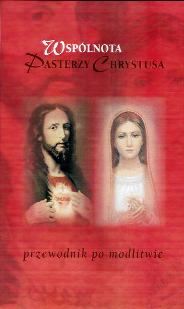 |
be spread all over the world —
A network of prayer dedicated to
My Heart —
praying for the priests, the Church
and the world —
I wish My images of My Sacred Heart
sold and put in all places —
and I wish devotion to My Heart
and Mary's Heart —
When one puts an image of the
Sacred Heart in their home and rooms and
pray these prayers, I promise
they will know a new peace —
Immaculate Heart
Immaculate Heart - Ivory
Sacred Heart of Jesus
Sacred Heart -Blessing
Immaculate Heart and Sacred Heart Pictures
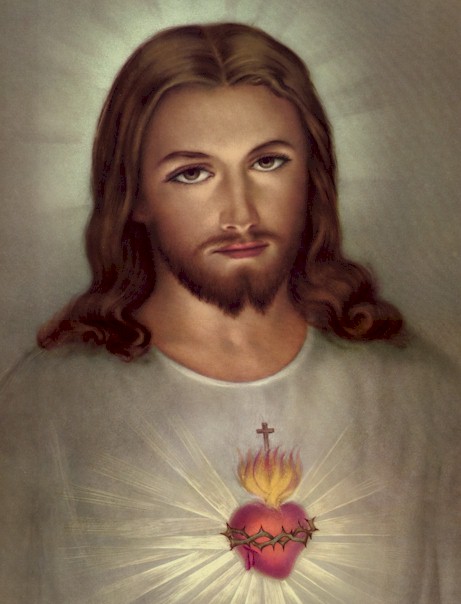
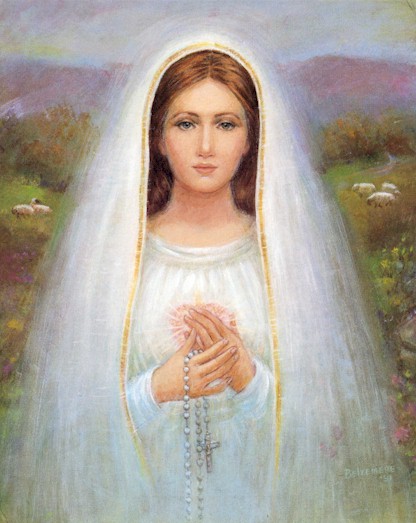
I am Lord and Master —
King of Heaven and Earth —
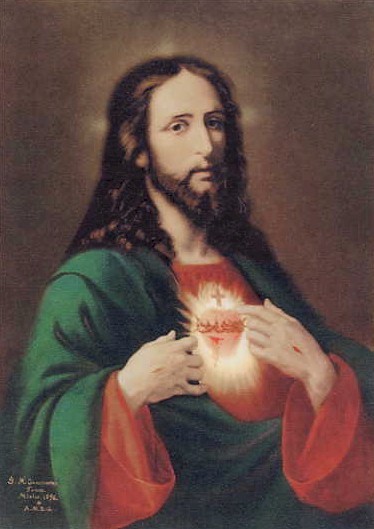
A Message for the Earth from Jesus
January 22, 1998
I am the Good Shepherd, these are My prayers, the prayers I give to help renew the Church and the world, all prayer chapters are asked to include these prayers (found in the Shepherds of Christ Prayer Manual). As My Apostles and Shepherds I ask you to encourage all existing Chapters to try to encourage all existing prayer groups to pray the Shepherds of Christ prayers. Encourage all Churches to pray these prayers. It is most urgent that the people of this earth concur with the Father's wishes to begin Prayer Chapters. This is an urgent request from the Good Shepherd. The flock will become one when they have given their hearts to Jesus and Mary. Encourage all priests to pray the Shepherds of Christ prayers. Your world will be lighted with great light as the people of this earth pray these prayers.
My promise is this to you My beloved earth: When you give your heart to Me and spread the devotion to My Sacred Heart, I will write your name In My Heart. I promise to give the greatest graces when you pray these prayers for renewal of the Church and the world and take all who pray them deeply into My Heart. The prayers I give will bring about the reign of My Sacred Heart and the triumph of Mary's Immaculate Heart. I am Jesus Christ, this is My message of January 22, 1998, Please circulate this message to your world. I am the Good Shepherd, I know Mine and Mine know Me and they follow Me. Grace My Shepherds, I will give you the greatest graces for spreading these words to this earth and to your Church. I love you, I am Jesus Christ, the Son of Man, it is the Plan of the Father that Prayer Chapters are begun immediately and the Priestly Newsletter is given to all priests. The Voice of the Good Shepherd speaks through it.
end of January 22, 1998
Here is the table of contents to the Response in Christ
book —
That alone is a profound outline —
This book of Fr. Carter's
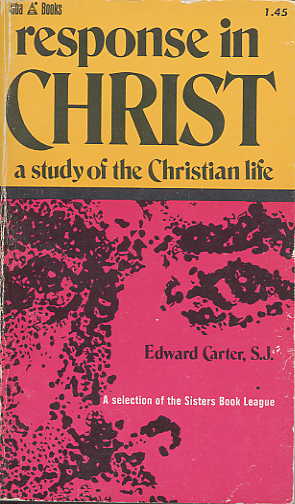

was published in several languages
Contents
Preface
Acknowledgments
ONE: The Concept of the Christian Life
1. The Christian Life as Prefigured in the Mosaic Covenant
2. Life in the New CovenantTWO: Christian Life within the Church
1. The Church as People of God and Body of Christ
2. The Church in Relation to Christ in his Threefold Mission
a) Christ as Prophet
b) Christ as King
c) Christ as Priest3. The various Vocations within the Church
a) The Laity
b) Religious
c) Bishops and PriestsTHREE: The Christian Life of Grace
1. What is Grace?
2. The graced Christian and various relationships
a) Relationship with the Father
b) Relation with Christ
c) Relation with the Holy Spirit
d) Relation with Mary
e) Relation with Members of the Church
f) Relation with Man and His World
FOUR: The Sacraments and the Mass
1. The Sacraments in General
2. The Mass
a) Sacrifice in General
b) Christ's Sacrifice
c) The Sacrifice of the Mass
d) The Christian's Participation in the Mass
FIVE: Incarnationalism and Transcendence
1. Bodily Values
2. Involvement with the World
3. Structure in the Spiritual Life
4. Change and Permanence in Christian Spirituality
5. Personal Vocation and Incarnationalism-Transcendence
SIX: The Christian and Sin
1. The Nature of
Sin
2. The Sacrament of Penance
SEVEN: The cross and Christian Life
1. Traditional and Contemporary Views of the Cross
2. Various Forms
of the Cross
a) Christian Self-discipline
b) Penance
c) Renunciation
d) Passive Suffering
e) Selflessness
EIGHT: Christian Faith
1. Faith as
Participation in God's Knowledge
2. Faith as Personal Encounter with God and Man in
Christ
NINE: Christian Hope
1. God as Object
of Hope
2. Hope and the Secular City
TEN: Christian Love
1. Our Need to
Love and Be Loved
2. Love of God
3. Love of Man
4. Love of Friendship
a) The Nature of Friendship
b) Man-Woman Friendships
c) Friendship as a School of Love
5. Christian Love Exercised According to the Various Vocations
ELEVEN: Other Christian Virtues
1. Humility
2. Courage
3. Temperance
4. Justice
5. Obedience
6. Sociableness
7. Prudence
a) Prudence in General
b) Prudence and the New Morality
TWELVE: Life in the Holy Spirit
1. Docility to the
Holy Spirit
2. Conditions for Life in the Spirit and Rules for
Discerning His Action
THIRTEEN: Christian Prayer
1. The
Contemporary Situation
2. Vocal Prayer
3. Meditative Prayer
a) The Nature of Meditative Prayer
b) Christ as Center of Meditative Prayer
c) Some Traditional Methods of Meditative Prayer
d) Some Contemporary Prayer Movements:
Transcendental Meditation, Zen, Yoga,
Pentecostal Prayer, Shared Prayer
e) Contemplation in Action
f) Meditative Prayer and Liturgy
FOURTEEN: Other Aids to Full Christian Living
1. Reading and
Study
2. Knowing Oneself
3. Guidance in the Christian Life
4. Retreats and Days of Renewal
5. A Plan of Life
FIFTEEN: The Christian Mystical Life
1. The Current
Scene
2. The Basic Nature of Mysticism
3. Ordinary Mysticism
4. Classical Mysticism
A Select Bibliography
Index
ONE The Concept of the Christian Life
There are various points of departure for a treatment of the Christian life. Our particular choice consists in giving a general, panoramic view of this life in this chapter with a consequent deepening of ideas in the pages to follow. Inevitably the themes put forth here will receive only a sketchy treatment, and to this extent the chapter will not give complete satisfaction. However, such a procedure allows for an immediate view of our complete life of grace in Christ. This preliminary glimpse can consequently serve throughout as a constant, unifying frame of reference.
The Christian life essentially consists in God's loving self-communication to us with our concomitant response to Him in love. One peculiar characteristic of this communication of God to man is that it has centered itself within a concrete historical framework. God's gift of Himself therefore establishes the process of salvation history. This process began with man's creation and elevation to the supernatural life, a life which is a participation in God's own divine life. This participation is real and, therefore, somewhat similar to life as it is in God Himself; however, since it is only a created sharing, man possesses it in an infinitely less perfect manner than God who is Himself this life.
Man rejected this self-communication of God in original sin. Yet God's desire to give Himself to man was not withdrawn. He determined to save man from his sinfulness, and thereafter the divine communication centered around the promised Redeemer. Salvation history preceding the advent of this Redeemer became a preparation for the Redeemer's coming. From the time of His coming, salvation history was and is the establishment and continuation of His redemptive work.
1. The Christian Life as Prefigured in the Mosaic Covenant
In the age prior to the coming of Christ, salvation history was rooted in the Mosaic period. At the heart of this Mosaic era was the great salvific event of the exodus (Ex 15:1-18). Through this event Yahweh led the Israelites out of Egyptian slavery and under Moses formed them into His People. The history of the Jewish people previous to this exodus event was merely a preparation for this central happening. Thus Israel in recalling its ancient traditions could see that Yahweh's covenant with Abraham, Isaac and Jacob was a preparation for the great covenant definitively established through Moses on Mount Sinai.
God, then, within the framework of salvation history has determined to communicate Himself according to a covenant. What is covenant? In reference to salvation history it is a mutual life relationship in love between God and His People, and among the People themselves. God on His part communicates His own life through grace, and man in return gives himself to God and his fellowman in loving service. There are various laws governing the multiple aspects of this life-relationship. There is a formal worship with its determined ritual. Yet everything centers around the essence of covenant, the life relationship.
As mentioned, the Mosaic covenant dominated the Old Testament period. At the heart of the formation of this covenant there was a transition process involved as the Jews were led forth from Egyptian slavery to freedom under the leadership of Moses. The Egyptians had finally consented to this departure of the Jews under the pressure of the last of the plagues inflicted upon them. Under this plague the Egyptians' first-born were slain. The Jews escaped this deathblow of Yahweh by marking their doorposts with the blood of the paschal lamb: ". . . I will go through the land of Egypt and strike down all the first-born in the land of Egypt, man and beast alike, and I shall deal out punishment to all the gods of Egypt, I am Yahweh! The blood shall serve to mark the houses that you live in. When I see the blood I will pass over you and you shall escape the destroying plague when I strike the land of Egypt." (Ex 12:12-13).
As the Jewish people escaped from Egyptian bondage they experienced a transition which was essentially religious in nature. This transition was from a less perfect to a more perfect type of existence, for in being released from slavery they were gradually formed into Yahweh's People. The definitive event of this formation occurred on Mount Sinai. Here the covenant between Yahweh and His People was sealed with sacrificial blood. Moses sprinkled with blood both the altar, representing Yahweh, and the Jewish people. Since blood signified life for the Jews, such an action had deep meaning for them. It symbolized the sealing of the covenant, the establishment of a new life-relationship between Yahweh and themselves.
2. Life in the New Covenant
This Mosaic covenant prefigured the covenant which was to be established in Christ. Yahweh had given himself to the Jews in a special way. He was their God and they were His People. This life relationship was highly imperfect, however, if compared to that instituted by Christ. The covenant life between God and man established by the Incarnate Word is of the most intimate nature. We see this if we consider the new covenant as being contained in a perfect way in Christ Himself. He is radically the new covenant.1 Covenant, remember, has various dimensions of love. Out of love God shares His life with man, and man in community responds in love by giving himself to God and relating in love with his neighbor. In Christ we perceive these relationships achieved in the most perfect manner possible. First of all, Christ in His humanity receives the divinity's gift of self in the highest degree – to such a high degree, in fact, that we have the hypostatic union as a result. In other words, the human nature of Christ is recipient of God's self-communication in such a perfect manner that it does not exist by reason of its own personal act of existence, but rather by the divine existence of the Word, the second person of the Trinity.
Christ as man – in the name of all men, for all men – perfectly receives God's communication of Himself in grace. This is the first movement of covenant life, downward from God to man. In the second movement of covenant, man's response, we again see Christ as central. As man, Christ makes the perfect response to God for all men. This response of Christ includes both His love for His Father and His relationship in love with men. His entire life was itself this perfect response. His life, submerged in a constant, loving conformity to His Father's will, was and is the perfect incarnate response which man is called upon to make to his covenant God.
The response which Christ made was centered in His death and Resurrection. These two events contained the whole of Christ's life and are intimately united. Everything which Christ did previous to Calvary was a preparation for Calvary and consequently shared its redemptive value. The Resurrection was in one way or another the completion of the work of Calvary. Since Christ's perfect response to the Father culminated in His death-resurrection, it is evident that Christ's life involved a transition just as did the life of the Jewish people in the old covenant. This transition of the Israelites was manifested in the exodus from Egypt. In fact, Christ's transition in death-resurrection was a fulfillment of the Jewish exodus; and just as the transition of the Jews marked a passage from a lower to a higher type of existence, so did Christ's transition or passover have this characteristic.
What was Christ's transition? Before Christ experienced death, He was limited by the sinfulness of the world into which He had immersed Himself in His Incarnation. He loved men, and He loved to be in their midst, and in the midst of their world. But He did suffer from the sinfulness of this world. Sinless though He Himself was, He was in certain ways affected and limited by sin. Indeed, sin destroyed Christ in his mortal existence. This shows us the degree to which Christ was limited by or "hemmed in" by the world's sinfulness. But through the passageway of His death, Christ passed beyond the limitations He had experienced in His mortal life. He conquered sin, and He rose into a more perfect type of life, that of the Resurrection. In such a life He could no longer suffer, He could no longer be "limited" by the sinful aspect of the world.
There is another similarity between the Jewish transition or exodus and the transition involved in Christ's death-resurrection. We saw the part that sacrificial blood contributed to the passover or transition of the Jewish people in two instances. The blood of the paschal lamb freed the Jewish homes from the deathblow of Yahweh immediately before their departure from Egypt, and ultimately it was sacrificial blood which sealed the Mosaic covenant upon Mount Sinai.
Sacrificial blood was also essential in Christ's passover or transition. It was through the shedding of His blood that He passed through death to Resurrection. It was thus His blood which made the transition possible and which sealed the new covenant. This new covenant, supplanting the old, is the new life relationship between God and His People, and the People themselves. Christ, in achieving new life through death-resurrection, gained it not only for Himself but for all His members.
The Christian, then, shares in the life of Christ's Resurrection. But if he participates in the Resurrection of Christ he must also share in Christ's death, since death is the way to Resurrection. St. Paul tells us: "We are dead to sin, so how can we continue to live in it? You have been taught that when we were baptised in Christ Jesus we were baptised in his death; in other words, when we were baptised we went into the tomb with him and joined him in death, so that as Christ was raised from the dead by the Father's glory, we too might live a new life." (Rm 6:2-4).
Through Baptism therefore the Christian is incorporated into Christ's death-resurrection. Baptism pledges the Christian to die to sin and ideally to all that is not in accordance with God's will, even though sin is not involved. Baptism also pledges the Christian to live vitally his new life in Christ, his share in Christ's Resurrection. As he is incorporated into Christ through baptism, the Christian is also made a member of the Church. Awareness of this simultaneous incorporation into both Christ and the Church emphasizes for the Christian the fact that his life of holiness in Christ is to be lived out in community. In other words, the Christian lives in Christ within the People of God, within the Church. This stress of contemporary spirituality upon the communal aspect of Christian holiness is firmly rooted in God's revealed truth. Throughout salvation history God has lovingly communicated Himself to man within the covenant framework with its communal dimension. He has also asked for man's response in love within this same covenant framework.
The Church in union with Christ is the new covenant. Since Christ is the Head of His Church, it follows that the Church with her members must live out the covenant life according to the structure which Christ gives her. The Church has no life, no pattern of life, except that which Christ gives her. This basic pattern or structure is death-resurrection. Christ established the Church by His paschal mystery, His death-resurrection. In so establishing the Church by such an event, Christ also determined how the Church essentially lives out her covenant life down through the ages – through death and Resurrection.
The Church, then, continues Christ's death-resurrection. She consequently continues the entire mystery of Christ, since Christ's entire life is contained in His passover event.2 We see therefore why the Church can be referred to as the continuation of the redemptive Incarnation. Indeed the Church is Christ, the mystical Christ. Because she is the earthly continuation of Christ, the Church has everything within her structure needed to be the source of salvation and sanctification for men of all times. For instance, in reference to the presently much-discussed theme of the Church's relevancy to modern man, we know from theological reflection that the Church has this relevancy radically structured within her very existence. This is simply an application of the reality that the Church actually does prolong the mission of the Incarnate Word; since Christ was relevant to His age, the Church has the capacity to be relevant to all ages.
What do we mean by saying Christ was relevant to His age? Christ revealed the Father and communicated the Father's life to men by adapting Himself in a fundamental way to the life situation which existed at that particular time in Jewish history. Since Christ through His humanity adapted His message to the people of His times, so the Church must use her innate capacity to be relevant for the men of this or that age. She must in a sense be constantly reincarnating Christ, for she is the only visible Christ which this world now has. This reincarnation largely means being relevant.
As the Church is the continuation of Christ, so is the life of the Christian. Just as the Church centers her life in Christ's death-resurrection, so does the life of the Christian. Both Church and Christian then are continually dying with Christ, dying to all which is not of Christ. At the same time Church and Christian are meant to rise more and more with Christ, assimilating ever more perfectly His life through grace. This life of grace is the Church's and the Christian's share in Christ's Resurrection. It is true that this life of grace will have its completion only in eternity. Nevertheless, it does have very real beginnings here in this life.
It is therefore apparent why the Church's life is directed to the liturgy, especially the eucharistic liturgy.3 For it is within the liturgy culminating in the Mass that the death-resurrection of Christ is constantly renewed in a special manner. In the Mass the People of God have the constant opportunity to assimilate the death-resurrection of Christ more and more into their lives. As they do so collectively and individually, the People of God are continuing Christ's life and mission upon earth.
The Christian life, then, is a response to God's gift of Himself. God in love gives us a life of grace, a share in His own divine life. We respond in love by giving ourselves to God and our fellowman, by dynamically living out this life of grace, this Christ-life, in the pattern of death-resurrection. This life of grace is meant to be exercised constantly, as the Christian loves God and man, in Christ, according to the will of the Father. Also, to reiterate, God intends that our life in Christ be lived out in the community of the Church. The Christian life can never solely be an individual's response to his God.
As the Christian lives out this life of grace in community, he is offering Christ a new humanity through which He can reincarnate Himself. It is not only through the Church as a whole that Christ reincarnates Himself, but also, ideally, through each Christian within the Church. Each Christian has a special responsibility and privilege. No one else can offer Christ the unique opportunity of reincarnating Himself as can this or that particular Christian. For each Christian is a unique, created imitation of God never again to be repeated. Each Christian has a unique humanity to offer Christ. To the extent that he fails to do so, to that degree Christ has lost this opportunity to reincarnate Himself through this humanity.
Consequently, the Christian life can be conceived as the Christian permitting Christ to live more and more through his total person. Christian holiness is continual growth in the assimilation of that great thought of St. Paul, ". . . I live now not with my own life but with the life of Christ who lives in me." (Ga 2:20).
There are many ways in which the Christian can permit Christ to live in and through him. Love of the Father and love of all men, of course, are the two great themes which will channel this reincarnation of Christ. These were the great driving forces in Christ's life, and consequently they will be so in the life of the Christian.
If the Christian is to grow in projecting Christ through his Christian personality, he must be aware of the many various ways in which Christ loved His Father, and His will. He must be aware of the various ways in which the Father's will comes to him, and thus he will realize the multiple ways in which he is to love the Father in embracing that will. The Father's will can come to him in joy and happiness or in pain and sorrow; in work or in relaxation; in a life of great obscurity as well as in a life which commands public attention; in frustration or in success. These and many other channels of the Father's will offer the Christian the opportunity to continue this witness of Christ's life: no matter how easy or difficult, the Father's will must be lovingly embraced in all things. This is how Christ radically saved the world. This is how the Church, living according to the same principle, cooperates with Christ in furthering His redemptive work.
1. Cf. Bernard Cooke, "Synoptic Presentation of the Eucharist as Covenant Sacrifice" in Theological Studies, Vol. 21, (1960), p. 36.
2. The Mystery of Christ is essentially one reality. Any of the individual mysteries implicitly contains the others. For a treatment of this, cf. L. Bouyer, Liturgical Piety (Notre Dame, Indiana: Notre Dame University Press, 1955), pp. 189-190.
end of excerpt
We were told to contact the Bishops
who are all over the world to do
as Mary said at Fatima to
consecrate their dioceses to the Sacred Heart
and Immaculate Heart
So we can go into this era of peace —
Mary spoke of at Fatima —
The Father wants the world to be as He intends —
this disorder and disobedience in the world
opposed to the Father's will has to be
dealt with
Jesus is the King of heaven and earth —
We must spread this devotion to the
Sacred Heart and Immaculate Heart and pray
for the priests, the Church and the world —
Mary appeared at Clearwater for
this purpose -- Help me
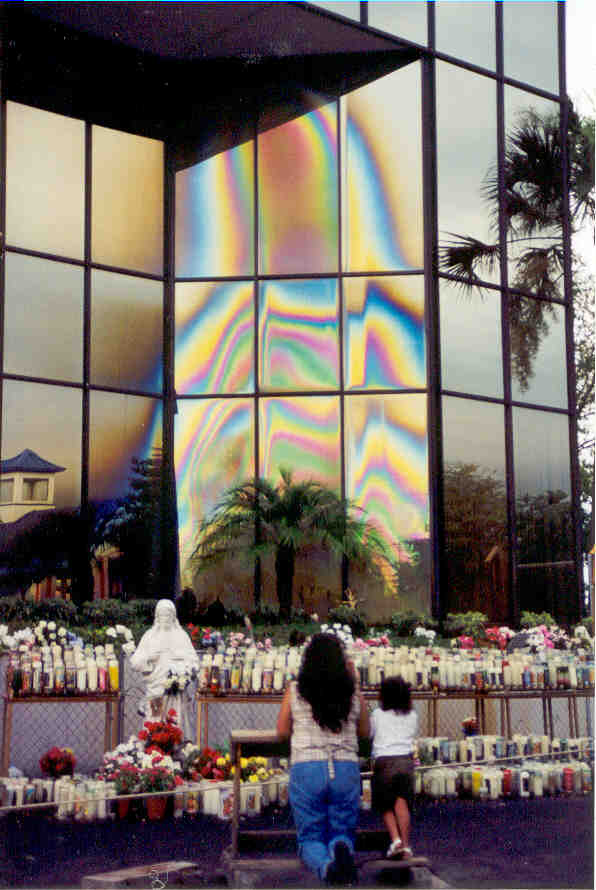
The strength the world needs,
comes from making Jesus, the
King and Center of Their Hearts —
for being united to the Mass
going on around the world —
When I need strength I think
of the Mass — I unite deeply
to Jesus — I pray for grace to
be outpoured for myself and
others and for the world —
We live the life, death and
resurrection in our lives —
We suffer with the human
condition — We see the slavery
of some serving satan —
We want Jesus, His commandments
to be obeyed —
To spread this devotion —
God is love
Jesus shows us, God created
us to love — to be
working together —
to be open —
to die to our impure, selfish
closed ways —
Jesus wants us united as a body —
Jesus is the head of the
body, the Church —
We must obey God —
He is the Creator — we are
the creatures —
The devil wants to dominate —
take out authority —
wreck structure —
throw out obedience —
The devil wants secularism —
The devil wants disobedience —
disunity —
disharmony
hearts filled with anger —
revenge, punishment,
feeling sorry for oneself —
God wants us to be actors —
to clean our hearts of
unforgiveness and hatred
and fill our hearts with
love —
We pray to You God for the
grace to love —
to have a Heart more like Yours
Song: Give Me Your Heart Oh Jesus
Our lives should be lived to
open more and more to God —
so we aren't shut down
and have to learn to open
in purgatory —
We want to be ready for the
beatific vision in heaven —
living a life of love —
unity —
harmony
more and more like Jesus —
Our heart, more and more like Jesus,
who died for us —
who gives us a sharing in His
life in baptism —
God, increase our faith, hope and
love
From the Spirituality Handbook
The Spiritual life and the Christian Virtues
(8)The life of sanctifying grace expresses itself through the various Christian virtues. Let us take a brief look at this life:
"The Persons of the Blessed Trinity have communicated Themselves to us in lavish love. When a person is in the state of grace, Father, Son, and Holy Spirit dwell within that person in an extraordinary fashion.
"Such is the intimacy of this Trinitarian communication that the Persons of the Trinity imprint Their image upon us. This image is our life of grace, our created participation in the life of the Trinity. We receive this life at Baptism, and our privilege and responsibility are to develop it as fully as possible during our earthly journey before experiencing its culmination in eternal life.
"Because Christ in His humanity is Mediator of our life of grace, it possesses not only a Trinitarian dimension, but a Christic aspect as well. We can readily understand, then, why our grace-life is very appropriately also called the Christ-life.
"Our Christ-life is centered in faith and love. Christian faith gives us an extraordinary capacity to know realities about God and the things of God. The virtue of Christian love allows us to accompany this faith-knowledge with an appropriate love-response. Christian hope is the chief support of faith and love. Finally, all the other Christian virtues are variously connected with these three main Christian capacities."
We hear much about faith and love, the two main Christian virtues. However, hope is also extremely important. One of the aspects of the virtue of hope is trust. Let's listen to a message of Jesus regarding trust:
(9)"My beloved priest-companion, tell my people to trust Me unreservedly. I am Lord and Master. I am God. So many fail to trust Me as they should. I love all My people much more than they love themselves! The great love I have for each person should encourage all to trust Me! The more you realize how much a friend loves you, the more you place your trust in that person. I am your perfect Friend. I love you much, much more than your best earthly friend! Tell My people to trust Me completely. Tell them to say often, 'Sacred Heart of Jesus, I place my trust in You.'" (Message of Jesus as given to Father Carter).
8. Edward Carter,
S.J., Prayer Perspectives, Alba House, Staten Island,
New York, 1987, p. 12.
9. Tell My People, op. cit.
1) God first loved us
2) Our response to God's love
3) We must love God, others,
ourselves as the Father wishes —
2 Peter 1: 3-7
The generosity of God
By his divine power, he has lavished on us all the things we need for life and for true devotion, through the knowledge of him who has called us by his own glory and goodness. Through these, the greatest and priceless promises have been lavished on us, that through them you should share the divine nature and escape the corruption rife in the world through disordered passion. With this in view, do your utmost to support your faith with goodness, goodness with understanding, understanding with self–control, self–control with perseverance, perseverance with devotion, devotion with kindness to the brothers, and kindness to the brothers with love.
Galatians 2: 19-21
In fact, through the Law I am dead to the Law so that I can be alive to God. I have been crucified with Christ and yet I am alive; yet it is no longer I, but Christ living in me. The life that I am now living, subject to the limitation of human nature, I am living in faith, faith in the Son of God who loved me and gave himself for me. I am not setting aside God’s grace as of no value; it is merely that if saving justice comes through the Law, Christ died needlessly.
Matthew 22: 34-40
The greatest commandment of all
But when the Pharisees heard that he had silenced the Sadducees they got together and, to put him to the test, one of them put a further question, ‘Master, which is the greatest commandment of the Law?’ Jesus said to him, ‘You must love the Lord your God with all your heart, with all your soul, and with all your mind. This is the greatest and the first commandment. The second resembles it: You must love your neighbour as yourself. On these two commandments hang the whole Law, and the Prophets too.’
Genesis 1: 26-27
God said, ‘Let us make man in our own image, in the likeness of ourselves, and let them be masters of the fish of the sea, the birds of heaven, the cattle, all the wild animals and all the creatures that creep along the ground.’
God created man in the image of himself,
in the image of God he created him,
male and female he created them.
1 John 4: 19-21
Let us love, then,
because he first loved us.
Anyone who says ‘I love God’
and hates his brother,
is a liar,
since whoever does not love the brother
whom he can see
cannot love God whom he has not seen.
Indeed this is the commandment
we have received from him,
that whoever loves God,
must also love his brother.
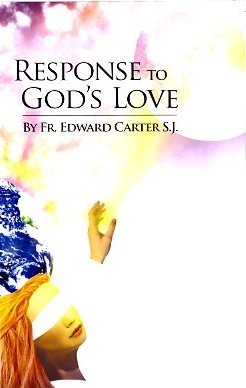
Excerpt from Response to God's Love, Chapter 8, by Father Edward Carter, S.J.
To authentically encounter others we must be properly aware of who they really are; we must, in short, be able to penetrate beyond surface appearances, which may or may not be appealing to us, and contact others in their core existence. When we are truly in touch with others at the core of their beings, we are simultaneously aware of their awesome dignity. We are conscious that these persons are created and redeemed by God in his love. Fortified with this proper awareness, we are thus in a position to relate to them as we should.
In order to be in touch with the inner self of others, we must be aware of or in touch with our own inner or true self. This awareness, in turn, is an awareness that our self is likewise made in the image of God, that it has been divinized in Christ and is to be oriented toward God and neighbor. Here, then, we see the profound interaction between the three awarenesses and loves—awareness and love of God, self, and neighbor. As Christians, consequently, we should have a maturing sense of how our existence is, in varied ways, profoundly interlinked with the existence of others. This feeling of union with others is not limited to those we directly encounter, but, in some sense, is directed to all members of the human family.
Let us now consider some of the main attitudes that the Christian should maintain and develop in his or her dealings with others. We will build upon the very basic attitude we have already mentioned—that we must always try to be aware of the true self of others, the self that has been created and redeemed by God's love. This awareness, in turn, calls forth our own love for them.
Matthew 25: 31-46
The Last Judgement
‘When the Son of man comes in his glory, escorted by all the angels, then he will take his seat on his throne of glory. All nations will be assembled before him and he will separate people one from another as the shepherd separates sheep from goats. He will place the sheep on his right hand and the goats on his left. Then the King will say to those on his right hand, "Come, you whom my Father has blessed, take as your heritage the kingdom prepared for you since the foundation of the world. For I was hungry and you gave me food, I was thirsty and you gave me drink, I was a stranger and you made me welcome, lacking clothes and you clothed me, sick and you visited me, in prison and you came to see me." Then the upright will say to him in reply, "Lord, when did we see you hungry and feed you, or thirsty and give you drink? When did we see you a stranger and make you welcome, lacking clothes and clothe you? When did we find you sick or in prison and go to see you?" And the King will answer, "In truth I tell you, in so far as you did this to one of the least of these brothers of mine, you did it to me." Then he will say to those on his left hand, "Go away from me, with your curse upon you, to the eternal fire prepared for the devil and his angels. For I was hungry and you never gave me food, I was thirsty and you never gave me anything to drink, I was a stranger and you never made me welcome, lacking clothes and you never clothed me, sick and in prison and you never visited me." Then it will be their turn to ask, "Lord, when did we see you hungry or thirsty, a stranger or lacking clothes, sick or in prison, and did not come to your help?" Then he will answer, "In truth I tell you, in so far as you neglected to do this to one of the least of these, you neglected to do it to me." And they will go away to eternal punishment, and the upright to eternal life.’
1 John 4: 21
Indeed this is the commandment
we have received from him,
that whoever loves God,
must also love his brother.
God first loved us.
He loves us overwhelmingly and
He wants our loving response
to Him —
He must love God, ourselves
and others,
we must love all three,
truly love as God desires —
1 Corinthians 10: 31
Whatever you eat, then, or drink, and whatever else you do, do it all for the glory of God.
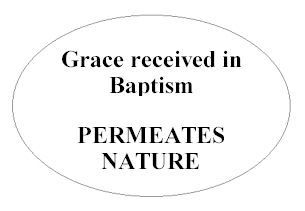
(From the November 22, 2000 message)
What should we say then? Should we remain in sin so that grace may be given the more fully? Out of the question! We have died to sin; how could we go on living in it? You cannot have forgotten that all of us, when we were baptised into Christ Jesus, were baptised into his death. So by our baptism into his death we were buried with him, so that as Christ was raised from the dead by the Father’s glorious power, we too should begin living a new life. If we have been joined to him by dying a death like his, so we shall be by a resurrection like his: realising that our former self was crucified with him, so that the self which belonged to sin should be destroyed and we should be freed from the slavery of sin. Someone who has died, of course, no longer has to answer for sin.
But we believe that, if we died with Christ, then we shall live with him too. We know that Christ has been raised from the dead and will never die again. Death has no power over him any more. For by dying, he is dead to sin once and for all, and now the life that he lives is life with God. In the same way, you must see yourselves as being dead to sin but alive for God in Christ Jesus.
2 Corinthians 4: 7-11
The hardships and hopes of the apostolate
But we hold this treasure in pots of earthenware, so that the immensity of the power is God’s and not our own. We are subjected to every kind of hardship, but never distressed; we see no way out but we never despair; we are pursued but never cut off; knocked down, but still have some life in us; always we carry with us in our body the death of Jesus so that the life of Jesus, too, may be visible in our body. Indeed, while we are still alive, we are continually being handed over to death, for the sake of Jesus, so that the life of Jesus, too, may be visible in our mortal flesh.
The new life at Baptism gives
us a new capacity to
know and love
which we do not have
without Baptism —
We can do Christ-like activities
through the virtues of
faith, hope and love —
John 15: 11-17
I have told you this
so that my own joy may be in you
and your joy be complete.
This is my commandment:
love one another,
as I have loved you.
No one can have greater love
than to lay down his life for his friends.
You are my friends,
if you do what I command you.
I shall no longer call you servants,
because a servant does not know
the master’s business;
I call you friends,
because I have made known to you
everything I have learnt from my Father.
You did not choose me,
no, I chose you;
and I commissioned you
to go out and to bear fruit,
fruit that will last;
so that the Father will give you
anything you ask him in my name.
My command to you
is to love one another.
1 Corinthians 2: 6-16
But still, to those who have reached maturity, we do talk of a wisdom, not, it is true, a philosophy of this age or of the rulers of this age, who will not last long now. It is of the mysterious wisdom of God that we talk, the wisdom that was hidden, which God predestined to be for our glory before the ages began. None of the rulers of the age recognised it; for if they had recognised it, they would not have crucified the Lord of glory; but it is as scripture says: What no eye has seen and no ear has heard, what the mind of man cannot visualise; all that God has prepared for those who love him; to us, though, God has given revelation through the Spirit, for the Spirit explores the depths of everything, even the depths of God. After all, is there anyone who knows the qualities of anyone except his own spirit, within him; and in the same way, nobody knows the qualities of God except the Spirit of God. Now, the Spirit we have received is not the spirit of the world but God’s own Spirit, so that we may understand the lavish gifts God has given us. And these are what we speak of, not in the terms learnt from human philosophy, but in terms learnt from the Spirit, fitting spiritual language to spiritual things. The natural person has no room for the gifts of God’s Spirit; to him they are folly; he cannot recognise them, because their value can be assessed only in the Spirit. The spiritual person, on the other hand, can assess the value of everything, and that person’s value cannot be assessed by anybody else. For: who has ever known the mind of the Lord? Who has ever been his adviser? But we are those who have the mind of Christ.
Mary has a role in our
Christian life —
Mary is our Mother
John 19: 25-27
Jesus and his mother
Near the cross of Jesus stood his mother and his mother’s sister, Mary the wife of Clopas, and Mary of Magdala. Seeing his mother and the disciple whom he loved standing near her, Jesus said to his mother, ‘Woman, this is your son.’ Then to the disciple he said, ‘This is your mother.’ And from that hour the disciple took her into his home.
Mary is Mother of the Church
Mary is the Church's model
Mary is Mother of our
Christ-life
John 2: 5
His mother said to the servants, ‘Do whatever he tells you.’
Mary always takes us to her Son —
The Heart of Mary is the symbol of
her love for us —
In the Litany it says,
"Mother of divine grace"
In summary, we go to the Father
through and with Christ
in the Holy Spirit with
the assistance of Mary
our spiritual Mother —
Order your Christmas presents that last!
Please remember us when buying
your
Christmas gifts.

$1.00 plus shipping
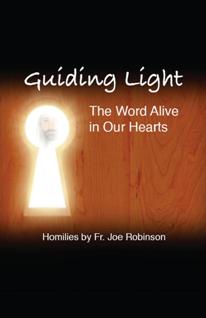
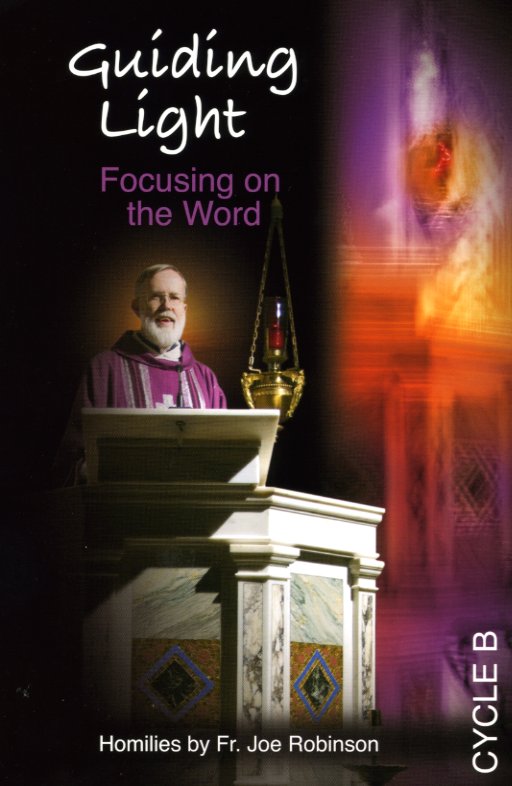


Homilies by Fr. Joe Robinson
$10.00 each plus shipping
Call Doris
1-888-211-3041
| Rita Ring |
|
||||||||||||||||||||||||||||||||||||||||||||||||||||||||||||||||||||||||||||||||||||||||||||||||||||||||||||||||||||||||||||||||||||||||||||||||||||||||||||||
| Fr. Joe Robinson |
|
|
|
|
|

|
|
|
|

|
|
|
|

|
|
|
|
| Fr. Edward J. Carter |
|
||||||||||||||||||||||||||||||||||||||||||||||||||||||||||||||||||||||||||||||||||||
|
|||||||||||||||||||||||||||||||||||||||||||||||||||||||||||||||||||||||||||||||
|
||||||||||||||||||||||||||||||||||||||||||||||||||||||||||||||||||||||||||||||||||||||||||||||||
Get a canvas print of Mary's image
with a sliver of glass and
a little bottle of
Jesus and Mary water.The glass will be fixed behind the
back of the picture.Cost — $200.00
Also available
a cup with a Mary's image on it
Cost — $15
Call Doris
1-888-211-3041
or
1-727-725-9312
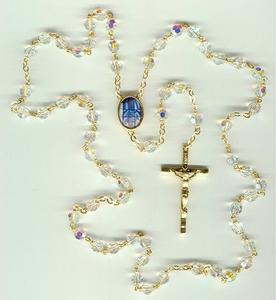
Rosaries with Mary's Image Available
Aurora Borealis Beads6mm - $30.00
8mm - $40.00
Call Doris
1-888-211-3041
or
1-727-725-9312
Statues
Sacred Heart of Jesus w/glass - 18
Our Lady-Guadalupe w/glass - 12
Limpias - 8
Immaculate Heart w/glass - 18
I Heart - Ivory w/glass - 18
Our Lady of Grace w/glass - 18
Our Lady-Mt. Carmel w/glass - 18
Our Lady of Lourdes w/glass - 18
Infant of Prague w/glass - 24
Sacred Heart of Jesus w/glass - 24
Sacred Heart -Blessing w/glass - 24
Sorrowful Mother w/glass - 24
I Heart - Ivory w/glass - 24
I Heart of Mary w/glass - 24
Our Lady of Lourdes w/glass - 24
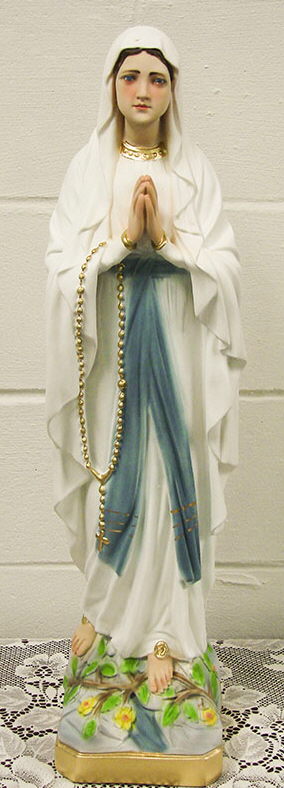
Our Lady-Guadalupe w/glass - 28
Our Lady of Grace w/glass - 24
Our Lady-Mt. Carmel w/glass - 24
St. Padre Pio
St. Joseph
St. Therese
St. Francis
St. Anthony
St. Claire
Limpias
St. Jude
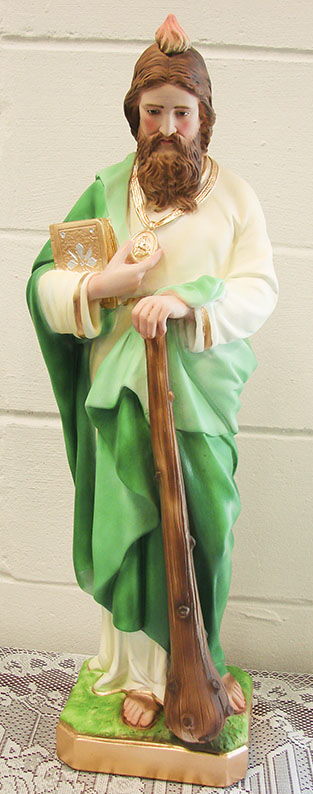
Divine Mercy
Holy Family
Angel
St. Philomena
Pieta - Marble
Pieta - Color
Holy Family
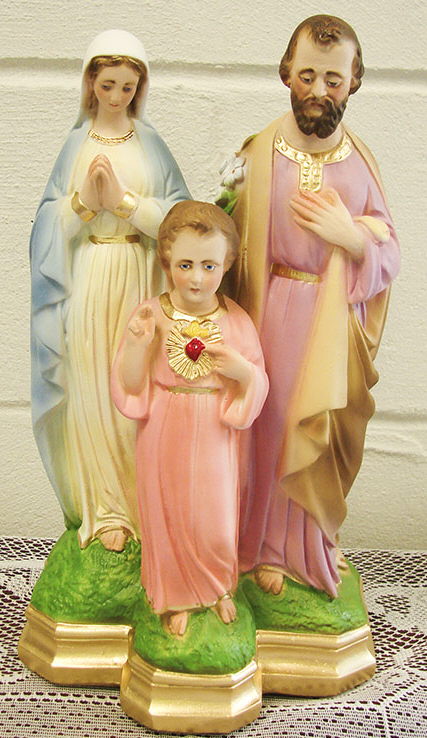
St. Anthony - 18
St. Francis - 18
St. Joseph - 18
St. Therese - 18
St. Rita - 18
St. Clare - 12
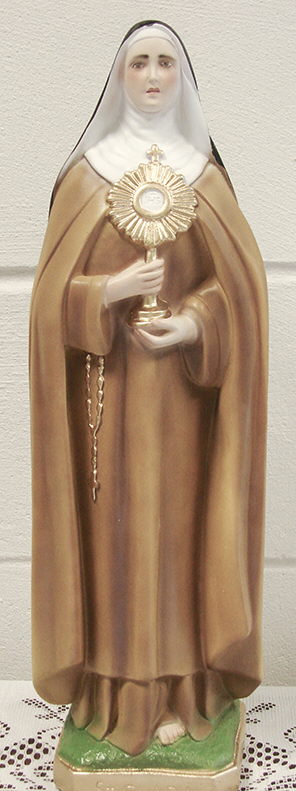
St. Rita - 12
St. Padre Pio - 12
Divine Mercy - 12
St. Michael - 11
Shepherds of Christ Ministries
P. O. Box 627
China, IN 47250
Toll free - 1-888-211-3041
Local - 1-812-273-8405
fax - 1-812-273-3182
web: www.sofc.org
e-mail: info@sofc.org
Size Price Quantity Holy Family
24"
$180
Limpias
24"
$125
St. Anthony
24"
$125
St. Claire
24"
$125
St. Francis
24"
$125
St. Joseph
24"
$125
St. Jude
24"
$125
St. Padre Pio
24"
$125
St. Therese
24"
$125
Divine Mercy 22"
$125 Angel 22"
$100 St. Philomena 20"
$100 St. Philomena 16"
$65 St. Joseph 18"
$65 St. Francis 18"
$65 St. Anthony 18"
$65 St. Rita 18"
$65 St. Therese 18"
$65 Pieta - Color 15" $75 Pieta - Marble 15" $75 Holy Family 12"
$60 St. Padre Pio - standing 12"
$40 St. Padre Pio - sitting 8"
$50 St. Michael 11"
$40 St. Rita 12"
$40 Divine Mercy
12"
$40 St. Claire 12"
$40 Limpias 8"
$25 Our Lady of Guadalupe w/glass 28"
$500 Our Lady of Mt. Carmel w/glass 24"
$500 Immaculate Heart of Mary w/glass
24"
$500 Immaculate Heart - Ivory w/glass
24"
$500 Infant of Prague w/glass
24"
$500 Our Lady of Grace w/glass
24"
$500 Our Lady of Lourdes w/glass
24"
$500 Sacred Heart of Jesus w/glass 24"
$500 Sacred Heart -Blessing w/glass 24"
$500 Sorrowful Mother w/glass
24"
$500 Immaculate Heart of Mary w/glass 18"
$300 Immaculate Heart - Ivory w/glass 18"
$300 Sacred Heart of Jesus w/glass 18"
$300 Our Lady of Lourdes w/glass 18"
$300 Our Lady of Grace w/glass 18"
$300 Our Lady of Mt. Carmel w/glass
18" $300 Our Lady of Guadalupe w/glass 12"
$200 Fatima w/glass
11"
$150 Fatima w/glass
18"
$250 Pilgrim Virgin w/glass 12"
$160 Pilgrim Virgin w/glass 15" $200 Pilgrim Virgin w/glass 18" $250 Pilgrim Virgin w/glass 27"
$450
Call for Shipping Price (1-888-211-3041)
Name
Sub-Total Address
IN Tax (7%) City
Shipping State Zip
Donation Telephone
Order Total
Call Doris
1-888-211-3041
or
1-727-725-9312


Immaculate Heart and Sacred Heart Pictures Available
with & without frames - different sizes available
Call Doris
1-888-211-3041
or
1-727-725-9312